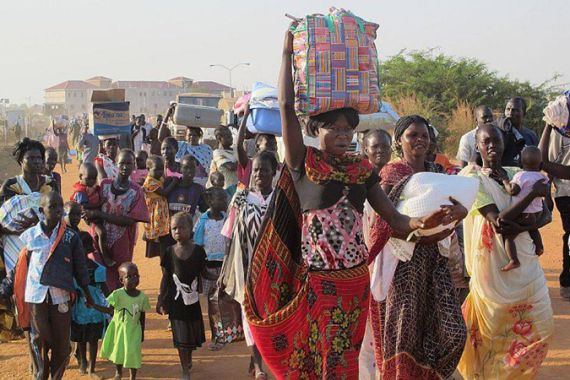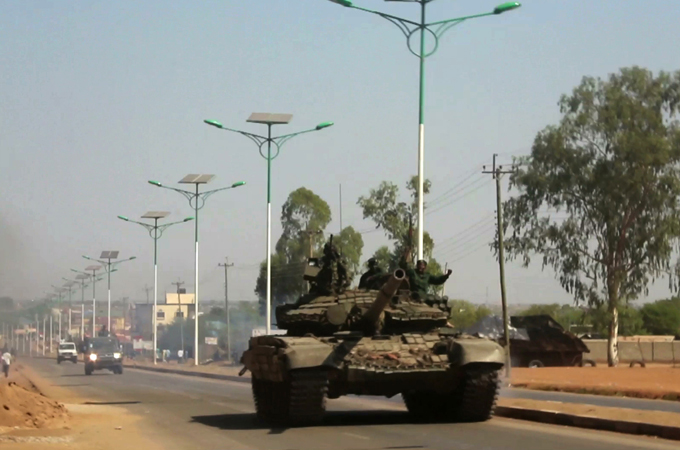South Sudan teeters on the brink
Observers say ethnic tensions at the heart of ongoing fighting that may determine fate of the country.

Swapping his signature cowboy hat and sharp suit for military fatigues, South Sudan President Salva Kiir’s choice of wardrobe when he went on television to accuse his rival of a coup attempt and denounce former Vice-President Riek Machar as a “prophet of doom” spoke louder about the state of politics in the world’s newest nation than his damning speech.
The fact that the capital Juba was on lockdown after a night of heavy gunfire that started as a few shots among men in his own presidential guard – internationally trained and once considered a success story for its diversity – also showed just how divided people are after almost five decades of civil war that ended in 2005.
And the people’s response to continuing gun battles in Juba showed their faith in a rebel-movement turned government that is riven by infighting between former warlords vying for a piece of this oil-rich new nation that won its freedom from Sudan in 2011, but now appears to be aping its oppressors.
Promising that South Sudan’s ruling party, the SPLM, would “never allow political power to be transferred through violence”, Kiir branded Machar “a criminal” and one determined to “persistently pursue his actions of the past”, a reference to a 1991 split that led to a massacre between factions of the president’s majority Dinka ethnic group and his rival’s Nuer minority.
But hours later, state forces were rounding people up and surrounding the homes of Kiir’s critics, while 13,000 people were sheltering at two United Nations bases in Juba, and others were fleeing the city in their hundreds, perhaps a further sign of how much faith there is in real peace and proper governance in the volatile state.
Given the disturbing reports of ethnically targeted killings, even if there is a political deal, it will be very difficult to put the genie back in the bottle.
A security expert close to the army – who asked not to be named because his access to the military depends on his anonymity – brushed off any ideas that the initial fighting was a coup attempt. He said it was sparked by rumours of arrests following a series of public statements criticizing Kiir’s increasingly dictatorial style, saying it was “an accident centred around paranoia and rumour”.
But he said the factional fighting within an army that is “a reflection of politics” – in a nation where many complain of the major tribe’s influence as a “Dinkocracy” – had the potential to ignite serious ethnic fighting nationwide.
“It’s the real lack of control that anyone has that’s the dangerous thing, and especially if fighting spreads to the peripheries,” he said.
Discontent
US Ambassador to South Sudan Susan Page said people were not necessarily lining up behind Machar to create an organised, fighting force, but the general discontent over the economic and political future and the crackdown on personal freedoms had spurred disunity in a country that’s identity was only forged in war.
Page said there were a number of people “aligned behind being unhappy about the way things are going”, and reports of arrests of senior figures and unconfirmed “reports of people being targeted because of their ethnicity” could spark mass unrest.
“There are concerning reports from beyond Juba including that fighting broke out between Dinka and the Nuer in Pibor in Jonglei and given the disturbing reports of ethnically targeted killings, even if there is a political deal, it will be very difficult to put the genie back in the bottle,” said Copeland.
She added her concern that the UN Peacekeeping Mission to South Sudan (UNMISS) had “not begun patrolling in Juba and has not reached areas where civilians are concentrated.”
UNMISS chief Hilde Johnson said that she could not speak as she was in a meeting.
Seven former ministers are confirmed as having been arrested, as fighting fanned out across the city in a country full of heavily traumatised, highly armed and seriously disappointed people.
“We received reports that the majority of the senior political figures that were opposed to Kiir’s leadership of the SPLM have been arrested,” said Casie Copeland, South Sudan analyst for the Brussels-based think-tank the International Crisis Group.
Machar’s house had been bombarded and “surrounded, including with tanks”, Copeland added while “parts of Juba have been reduced to rubble”, and fighting between Nuer and Dinka had broken out at military barracks in restive Jonglei state.
“The way they’re going after searching for people is really causing fear,” said Page, who had to get off the phone quickly before she could comment on her biggest concern for the country.
“Right now, the fact that the gunshots are very close, we’ll have to leave it there,” she said.
At the hospitals, dozens were bleeding to death in a country without a single bank.
“We are treating people, like 400 … 59 have died,” director of Juba Military Hospital Ajak Bullen told Al Jazeera.
“We have lost quite a big number, especially soldiers, and the problem is that we have a lack of blood,” Bullen said, adding numbers could rise quickly as “it continues and there’s random shooting” rocking the suburbs and mortar fire rumbling the entire city.
Wani Mena, a doctor at the hospital, put the death toll there at 20.
 |
| South Sudan President Salva Kiir [Reuters] |
Great conciliator?
The security expert said the biggest concern was a shift in politics that has seen the country’s leader – previously considered a great conciliator – turn into a tyrant that his erstwhile enemy, Sudan President Omar al-Bashir, might recognise.
“This is a different Salva Kiir to the one we saw before. He’s looking more and more like Bashir each day,” he said.
During a year of losing face at home and abroad and recent accusations of weakness and sickness denting Kiir’s image, the big man’s bold gestures seem to have reached a climax.
After reshuffling the army and retiring many generals, then stripping Machar of most vice-presidential powers to stop his attempts at grandstanding at home and abroad ahead of a party convention, in July Kiir dissolved some key party institutions. He also suspended the secretary general of his party Pagan Amum, and when he tried to speak out, issued yet another decree banning him from leaving the capital or speaking to the media.
Amum was less than chatty on Monday night, but said he was unsure of Machar’s whereabouts after a series of rumours that they had both been arrested.
“I am fine, that’s all I can say,” he said before putting down the phone.
Machar’s spokesman James Gatdet Dak told Al Jazeera, “He [Machar] has not been arrested. He’s in Juba. He’s fine, very fine.”
Oil pressure
Just six months after independence, South Sudan decided to shut off its only source of revenue – some 350,000 barrels of oil produced daily – in a spat with Khartoum over how much it should pay to export from a landlocked, largely barren state through infrastructure and a port in the north.
 |
| A tank patrols the capital Juba on Monday [Reuters] |
Reeling from the shock of now being the sole provider of healthcare, education and all other basic services in a country where the president admits that $4bn has been stolen by 75 past and present officials, donors were astounded when soon after, South Sudanese troops marched into a contested oil field, sparking weeks of clashes that many feared would trigger an all-out war.
Some sharp words and the threat of losing support from the US – South Sudan’s chief advocate and provider of military assistance – meant that Kiir had to doff the cowboy hat given to him by former US president George W Bush and persuade troops to pull out.
The oil was turned back on 18 months later as the country stood on the brink of economic collapse, and it seemed that stability would rule as Bashir and Kiir made amends during the northern leader’s historic visit to Juba. Instead it seems to have instilled Kiir with the confidence needed to clean house, starting with his critics.
Kiir and Machar, representing the country’s two major ethnic groups, still have the major carrot of aid money and international support to ward off a major battle. But right now, “it appears both sides are fighting for their political survival”, said Copeland.
And South Sudan could also be fighting for its freedoms once more.
“The impact of this fighting is going to shape the future of South Sudan. Parts of Juba have been reduced to rubble. Ethnic tensions have been brought into the open with devastating impact, and the political dispensation of South Sudan is going to be shaped by what’s happened in the last few days,” she said.